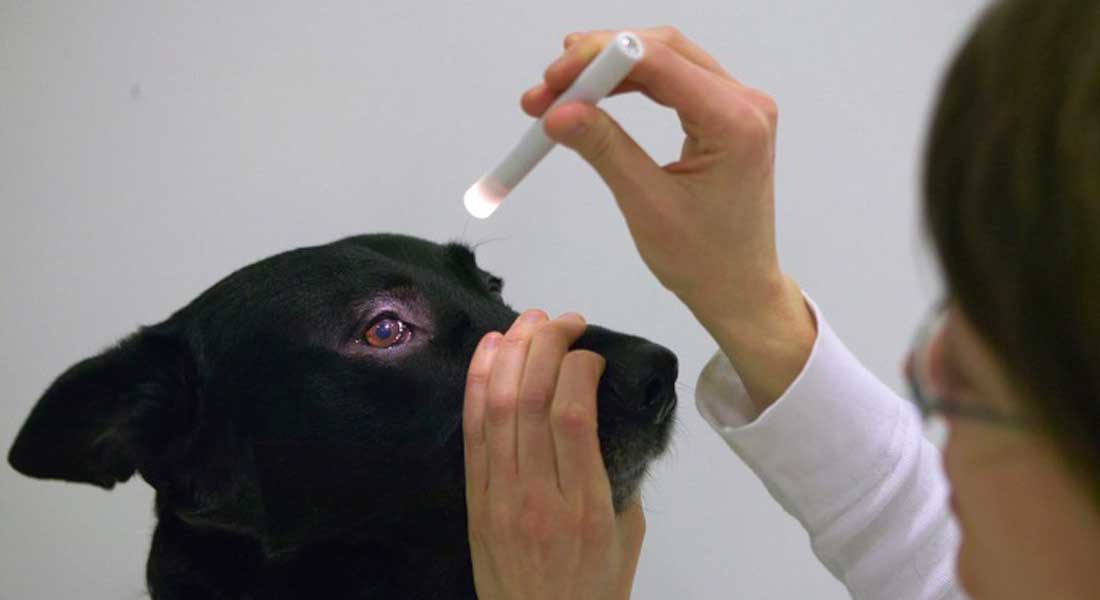Companion Animal Neurology - Neurosurgery and Neuro-Ophthalmology
In theory and practice
This course is a specialisation course at the Master of Companion Animal Clinical Science. The Master is a post graduate education targeted small animal veterinarians seeking Continuing Professional Development (CPD).

This course module will have a special emphasis on the approach to neurological patients that are candidates for surgical therapeutic procedures, especially surgery of the spine. As dysfunctional bladder control is a common complication with spinal cord lesions, neuro-urology addressing neuronal innervation and control of the bladder is reviewed. Furthermore, this course module will address neuro-ophthalmology in theoretical lectures.
The course consists of theoretical lectures that can advance the participants knowledge and understanding of high quality neurosurgery for especially the spine and lesions and diseases within companion animal neuro-ophthalmology. Neuro-surgery includes practical training in spinal surgery in a neuro-surgery wet lab.
The purpose of this course module is to extend the students’ knowledge, skills and competences within the approach to, assessment and management of neurological patients in need of surgery including the planning of perioperative management and special analgesia requirements. The course will extend the students’ knowledge, skills and competences within the approach to, assessment and management of companion animal neurological patients with neuro-ophthalmological problems.
Read more about the Master of Companion Animal Clinical Science.
Lectures, e-learning, theoretical and practical exercises. Case-study work.
As part of the course, you will have to perform oral presentations and hand in a number of written exercises / cases and procedure protocols.
Having completed the course, the student must be able to:
Knowledge
- Understand the etiology, pathophysiology and clinical appearance of neurological disorders in companion animal patients with a focus on the theory of neuro-ophthalmology and theoretical and practical surgical intervention of especially the spine.
- Define and identify relevant anatomical structures of importance for a successful outcome of neurosurgery with a main emphasis on spinal surgery.
- Understand and use common and typical surgical techniques for companion animal neurological patients in need of surgery of the spine and be able to plan perioperative requirements, including post-operative management, pain alleviation and rehabilitation.
- Explain, reflect upon, and discuss a problem oriented and evidence based work-up and treatment plan for companion animal patients with neurological surgical disease.
- Understand the neuroanatomy, lesion localization and common diseases of the neuro-ophthalmological system in companion animals.
Skills
- Assess companion animal neurosurgical patients preoperatively, and plan and perform perioperative treatment for such patients.
- Perform common and typical surgical techniques for companion animal neurological patients in need of surgery, with a special emphasis on spinal surgery.
- Assess companion animal neuro-surgical patient’s perioperatively with focus on treatment effect, complications and prognosis. Assess, prognosticate and suggest treatment strategies for companion animal patients with neuro-ophthalmological problems
Competences
- Evaluate, plan and manage a diagnostic workup for patients with neurological disease in need of surgical intervention.
- Plan advanced therapy/procedures for companion animal neurological patients in need of surgical intervention of the spine.
- Independently obtain, evaluate and elaborate on evidence based new knowledge within companion animal neurological patients that are candidates for surgery and demonstrate knowledge of typical surgical techniques for companion animal neurological patients in need of surgery, with a special emphasis on spinal surgery.
- Collaborate and communicate within and between specialist and non-specialist peers and lay- persons involved in companion animal surgical neurological patient management.
- Understand and perform a well-founded clinical and therapeutic approach to patients with neuro-ophthalmological problems.
- Hold a degree in Veterinary Medicine
- Hold one of the following certifications
- DVA Certificate in Small Animal Diseases (equivalent to the 4 compulsory courses of the Master of Companion Animal Clinical Science)
- Swedish / Norwegian / Finnish specialist in diseases of dogs and cats
- Equivalent competences
- Have a minimum of 2 years of relevant work experience from companion animal practice
- Be proficient in English
Find detailed information about the formal requirements for this course.
The course responsibles at the specialisation track in Companion Animal Neurology are:
- Professor Mette Berendt, Department of Veterinary Clinical Sciences, The Faculty of Health and Medical Sciences, University of Copenhagen, Denmark.
- Associate professor Hanne Birgit Gredal, Department of Veterinary Clinical Sciences, The Faculty of Health and Medical Sciences, University of Copenhagen, Denmark.
Lecturers at the specialisation track are:
- Joane Parent, DMV, MVetSc, DipACVIM Neurology, Professor Veterinary Neurology, University of Montreal, Canada
- Fraser McConnel, BVM&S, DVR, DipECVDI, CertSAM, MRCVS, RCVS Specialist in Small Animal Diagnostic Imaging & EBVS® European Specialist in Small Animal Diagnostic Imaging, University of Liverpool, United Kingdom
- Patrick Kenny, DVM, BVSc (Hons) DipACVIM Neurology, DipECVN, FHEA, MRCVS, SAHS-Vets Specialist Hospital, Sidney, Australia
Course details
| Duration: | 5 days on campus |
| Dates: | 11-15 November 2024 |
| Frequency: | Only available every second year |
| Course capacity: | 12 students |
| Place: | University Hospital for Companion Animals, Frederiksberg, Denmark |
| Course fee: | EU/EEA citizens Single course participant: 36,500 DKK Master student: 33,000 DKK Non-EU/EEA citizens Single course participant: 40,740 DKK Master student: 37,240 DKK Tuition fees include course materials and lunch/coffee. Books are not included in the tuition fees and must be purchased by the participants. |
| Level and credit: | Master course; 6 ECTS |
| Examination date: | Please consult the exam schedule |
| Application deadline: | Master's programme: 1 May 2023 Course: 16 September 2024 |
| Admission: | To be admitted, you must meet the admission criteria for specializations at Master of Companion Animal Clinical Science |
The opening of the application period is announced via the programme newsletter.
Download course curriculum
